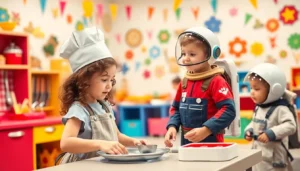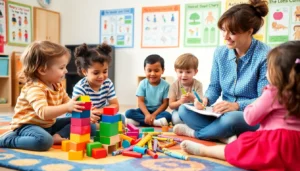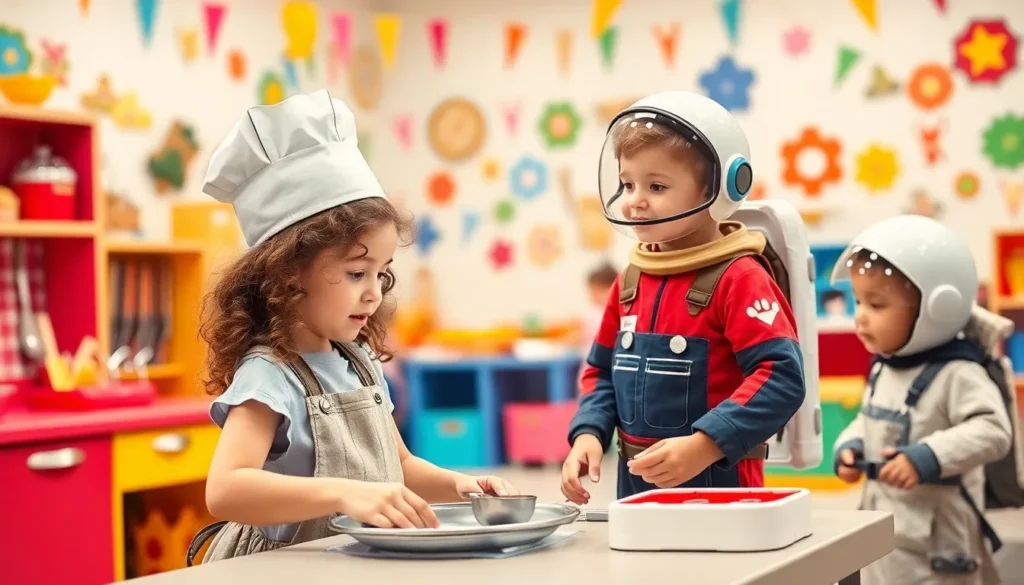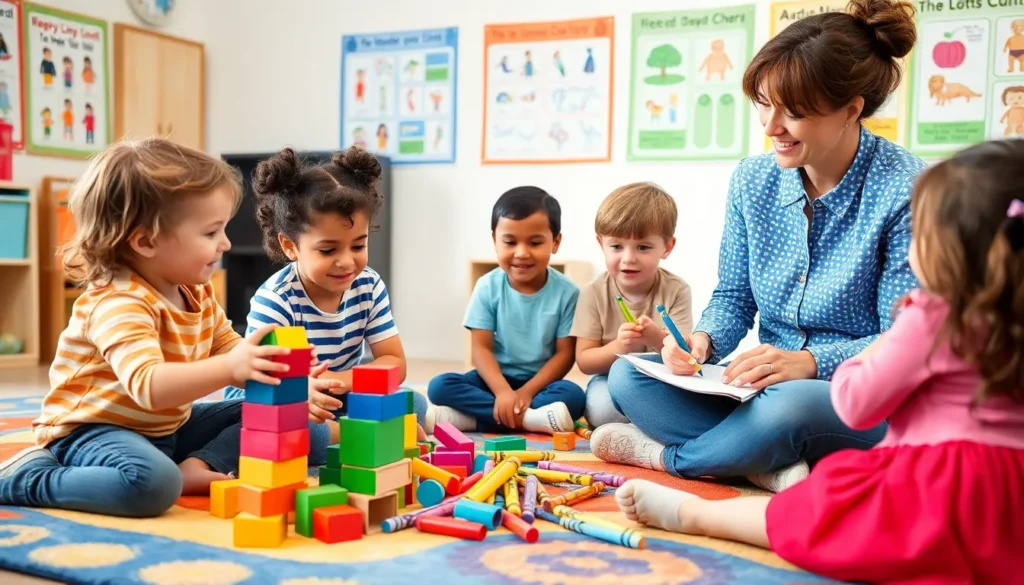Table of Contents
ToggleIn a world where “serious” often overshadows “fun,” play-based learning emerges as the superhero of early childhood education. Imagine kids diving into a world of blocks, colors, and giggles while unknowingly mastering critical skills. It’s like sneaking veggies into a delicious smoothie—only this time, the veggies are creativity and problem-solving!
Overview of Play-Based Learning
Play-based learning stands out as an essential strategy in early childhood education. This method fosters children’s developmental growth through engaging activities. Activities like role-playing, building with blocks, and artistic expression encourage creativity and exploration.
Children connect with their environment during play. Social skills also develop as they interact with peers. They learn cooperation and conflict resolution, crucial for later success. This approach enables children to navigate emotions while fostering resilience.
Additionally, play-based learning enhances cognitive skills. Problem-solving abilities flourish as children encounter challenges in play scenarios. For instance, when constructing a tower, they experiment with balance and gravity. Discovery and inquiry become integral parts of this learning process.
Beyond cognitive and social benefits, play supports linguistic development. Children express themselves verbally during play, expanding vocabulary and communication skills. Storytelling and recounting experiences strengthen their understanding of narrative structure.
A study by the National Association for the Education of Young Children indicated that play-based learning significantly improves academic outcomes. The integration of play into educational standards aligns with developmental appropriateness. Children thrive in environments where learning feels natural and enjoyable.
Incorporating elements of play in daily learning routines not only supports skill acquisition but also inspires a lifelong love for learning. Educators play a crucial role in facilitating this process by providing resources and creating stimulating environments. A well-structured play-based curriculum benefits children both now and in their future educational endeavors.
Importance of Early Childhood Education
Early childhood education plays a crucial role in foundational learning. This stage emphasizes the need for effective strategies that promote holistic child development.
Cognitive Development
Cognitive development thrives during early childhood education through stimulating experiences. Children engage in hands-on activities that challenge their thinking skills. Activities such as problem-solving puzzles encourage critical thinking. Discovery becomes a natural part of the learning process, as children explore concepts like cause and effect while playing. Research from the National Association for the Education of Young Children demonstrates that play-based learning enhances brain development. Enhanced memory, attention, and reasoning emerge as children navigate playful challenges. Cognitive skills form the basis for future academic success, making early investment essential.
Social Skills Enhancement
Social skills enhancement occurs naturally within play-based learning environments. During play, children interact with peers, learning to share and collaborate. Engagement in group activities fosters teamwork and communication skills. Role-playing scenarios help children navigate emotions and develop empathy. Conflict resolution becomes essential as they learn to negotiate and solve disagreements. According to studies, strong social skills correlate with later academic and personal success. By prioritizing play-based learning, early childhood education sets the stage for children to build healthy relationships and thrive in diverse social settings.
Benefits of Play-Based Learning in Early Childhood Education
Play-based learning offers numerous benefits that contribute significantly to a child’s growth and development. Engaging in playful activities allows children to thrive in various areas of their lives.
Encouraging Creativity and Imagination
Creativity flourishes in play-based environments where children explore new ideas and concepts. Engaging in role-playing and artistic activities enables kids to invent stories and construct imaginative scenarios. Their curiosity drives them to experiment with different materials and express individual thoughts. When children participate in open-ended play, they develop a strong sense of originality and problem-solving skills, ultimately preparing them for future academic challenges.
Physical Development and Coordination
Physical development advances through play-based learning, enabling children to enhance their motor skills. Activities like climbing, jumping, and running allow kids to build strength and coordination effectively. When participating in group games, they learn to navigate shared spaces while also practicing balance and spatial awareness. Fine motor skills improve as children manipulate building blocks or work on crafts. This combination of gross and fine motor skills lays the foundation for more complex physical activities later in life.
Emotional Regulation and Resilience
Emotional regulation significantly improves in play-based learning environments where children navigate their feelings. Through play, kids face challenges that require coping strategies and adaptability. They learn to express emotions, which fosters empathy toward others. Solving conflicts with peers teaches important resilience skills, equipping children to handle future difficulties. As they engage in imaginative play, developing self-awareness becomes natural, setting the stage for strong interpersonal relationships and emotional health.
Implementing Play-Based Learning Strategies
Educators can implement play-based learning strategies by creating stimulating and engaging environments. Providing materials like blocks, art supplies, and imaginative play props enables children to explore their interests. Encouraging open-ended activities fosters creativity, allowing children to express themselves freely.
Structured activities, such as guided role-playing, help children navigate social interactions. For instance, scenarios that involve sharing or teamwork allow kids to practice crucial social skills, such as cooperation and communication. Facilitating group discussions about their play experiences also enhances linguistic development through verbal expression.
Planning regular outdoor play sessions promotes physical development, boosting motor skills and coordination. Activities such as climbing or running increase children’s confidence and resilience, contributing to emotional well-being. Safety remains a priority, ensuring children feel secure while engaging in active play.
Integrating teacher-led discussions about play experiences encourages reflection and critical thinking. This method helps children connect their play activities to real-world concepts, enhancing cognitive growth. Observing children during their play offers insights into their learning and development, allowing educators to tailor approaches that align with individual needs.
Incorporating families into the learning process enriches children’s experiences. Sharing play-based learning activities with parents can strengthen home-school connections. Families can support development by engaging in play at home, emphasizing the importance of a collaborative approach to education.
Monitoring progress in play-based learning through ongoing assessments helps maintain a focus on developmental objectives. Utilizing observational data highlights areas for further growth and enables targeted interventions. Providing feedback to children reinforces learning, helping them recognize their achievements and potential for development.
Challenges and Considerations
Implementing play-based learning in early childhood education presents specific challenges. Educators may encounter resistance from parents who favor traditional teaching methods. Communicating the benefits of play-based approaches to families fosters understanding and support for the methodology.
Training and professional development for educators are essential. It enables them to effectively facilitate play-based learning experiences. Furthermore, ongoing support ensures that teachers remain confident in their abilities to guide children’s exploration and creativity.
Classroom environments may require adjustments to prioritize play while meeting curriculum standards. Designing spaces that encourage interactive play with ample resources can be challenging. Balancing structured activities with open-ended play requires careful planning and flexibility.
Assessment methods can present another obstacle. Traditional testing may not fully capture the skills children develop through play. Educators must adopt alternative assessment techniques that reflect the learning outcomes associated with play-based experiences.
Time constraints in the daily schedule can limit opportunities for play. Implementing strategies to integrate play into various subject areas maximizes learning potential. Effective time management ensures children receive ample time for exploration without sacrificing academic goals.
Finally, varying developmental levels among children require differentiation in play-based activities. Tailoring experiences to meet diverse needs supports individual growth. Understanding each child’s unique learning style enhances the effectiveness of play as a teaching tool.
Embracing play-based learning in early childhood education offers a transformative approach that nurtures children’s overall development. This method not only enhances cognitive and social skills but also fosters creativity and emotional resilience. By engaging in playful activities, children develop essential problem-solving abilities and learn to navigate their feelings in a supportive environment.
Educators play a pivotal role in facilitating these experiences, creating spaces that inspire exploration and collaboration. Prioritizing play-based learning equips children with the skills they need for future academic success and personal growth. As the educational landscape evolves, integrating play into daily routines remains crucial for cultivating a lifelong love for learning.










